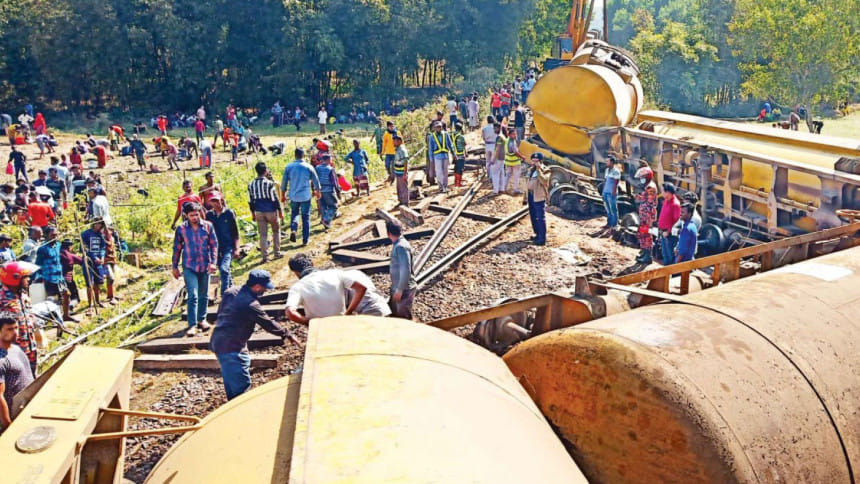Akhaura-Sylhet Rail Line: Derailments all too frequent

After a freight train carrying diesel derailed at Gutigaon village of Sylhet's Fenchuganj around Friday midnight, the fuel spilled from the tank wagons. Hearing the news, several locals rushed to the spot with whatever they had and started collecting the diesel.
Luckily, a fire disaster did not occur.
This was not the first time such an incident happened at the Akhaura-Sylhet section under Bangladesh Railway's Eastern Zone. Four other fuel-laden trains derailed at the section in the past five months alone, causing substantial damage to the trains, their wagons and the tracks.
The accidents also upset the train schedule, causing suffering to people.
After the latest derailment, it took the authorities 27 hours to restore the rail link on that particular route.
THE DERAILMENTS
According to Bangladesh Railway's annual report, 91 train accidents, including 78 derailments, took place in the country in the fiscal 2018-19. The damage caused in the accidents was estimated to be Tk 5,696 crore.
The data on the current year is not available.
As per media reports, nine major train derailments took place in the Akhaura-Sylhet section between February, 2019 and this Friday. But many incidents of derailment go unreported.
On February 1, 2019, a freight train derailed in Sylhet's Dakshin Surma area and a passenger train fell off the tracks on June 2, 2019 in Habiganj's Sayestaganj. Another derailment was reported on June 24, 2019 in Moulvibazar's Kulaura.
Two fertilizer-laden trains derailed in Moulvibazar's Kulaura upazila on December 29, 2019 and November 11 last year.
Besides, oil-carrying freight trains derailed at Kulaura in September 15 last year, Moulvibazar's Sreemangal upazila in November 7 that year and Habiganj's Madhabpur upazila later on December 6.
According to a document received by The Daily Star, Meghna Petroleum Limited filed a claim of Tk 88.20 lakh in compensation from the Bangladesh Railway after the freight train derailment at Sreemangal on November 7 last year.
Four oil-laden wagons fell off the tracks in that incident. The wagons were carrying 99,720 litres of diesel and 39,231 litres of kerosene, worth Tk 87.27 lakh while the freight cost of these tankers was Tk 93.98 thousand.
THE CAUSES
As part of the Assam-Bengal Railways expansion initiative, rail tracks of the Akhaura-Kulaura-Karimganj (Karimganj is in Assam, India) were constructed in 1891-1896 and Kulaura-Sylhet rail tracks in 1912-1915, said BR sources.
Since then, the 179 kilometres Akhaura-Sylhet rail lines have been being repaired occasionally, but no major upgrade was ever done.
According to railway engineers, 13 rail bridges on the route are risky while parts of the tracks are through hilly terrain, full of blind bends and are not properly maintained.
Passenger trains on these tracks have a limit of 50-55km per hour or even slower in the risky parts; while the freight trains have to travel at 40km per hour or even slower, railway engineers said.
Shubaktogin, chief engineer (east zone) of Bangladesh Railway, said, "Apart from risky tracks and hilly terrain, there are a number of reasons behind the derailments. The whole section badly needs a major revamp."
CONVERSION PROJECT
To revamp the section, a project to convert the metre-gauge railway line into dual-gauge from Akhaura to Sylhet was planned years ago.
In September 2015, the rail authorities signed a memorandum of understanding (MoU) with a Chinese company for the project.
The Executive Committee of the National Economic Council (Ecnec) in April last year approved the project that was estimated to cost Tk 16,104 crore.
But the project is being further delayed as the Prime Minister Office (PMO) on September 30 last year formed a committee to review the negotiated contract cost.
BR Joint Director General (engineering) Md Romzan Ali, assigned to oversee the project, said, "The project is still under planning and we can see that it will take time to get the final approval. The work will begin only after that."
[Mohammad Suman from Chattogram contributed to this report]

 For all latest news, follow The Daily Star's Google News channel.
For all latest news, follow The Daily Star's Google News channel. 



Comments